Much has been said about how disinformation threatens democratic discourse worldwide, with social media often blamed for this problem. However, less attention is paid to the role of search engines in spreading and reinforcing belief in disinformation.
Despite many media literacy initiatives advocating for fact-checking news through search engines, there is insufficient evidence of the effectiveness of this strategy in combating disinformation. Understanding whether and to what extent a search engine reduces belief in disinformation is critically important, given most internet users’ reliance on them for information about politics and forming opinions on current events.
Last week (December 20, 2023), an article titled Online search results can increase belief in misinformation was published in Nature, one of the oldest scientific journals.
In five experiments, researchers found that online search often increases the likelihood of belief in false news. This is due to “data voids” or “information spaces with confirming data from low-quality sources”. When people search online to check news, especially fresh news, they often encounter less credible information. This is exacerbated by low-quality news publishers using SEO to promote their articles, leading to a “propaganda feedback loop”.
One study shows that over 25% of Google users click on the first search result. Thus, if credible information never makes it to the top search results due to data voids, misinformation is likely to remain unnoticed.
Researchers also examined the impact of political ideology and digital literacy on susceptibility to data voids. They found that low digital literacy and ideological alignment with the news source increase the likelihood of encountering data voids. Personalization of search results makes these factors even more significant.
Let’s examine the issue for Belarusian internet users, using both quantitative research results and our own Google tools, as well as third-party services for search optimization.
The influence of Russian news resources on the Belarusian internet audience
Surveys of the Belarusian internet audience show a serious influence of Russian news sites. In a study of the media consumption of the Belarusian internet audience both in the country and abroad, conducted in September-October 2023, initiated by the Digital Skills Coalition and the Belarusian National Platform, respondents in Belarus who positively answered the question “Do you feel that the media are deceiving you?” said they seek information on Belarusian sites 30.7% and 30% indicated on Russian sites.
If we analyze search trends in the news niche (Google trends) in Belarus from December 2021 to December 2023 for media popularity, it turns out that requests for the Russian propaganda “RIA Novosti” and “Lenta.ru” are often higher than for the Belarusian state news agency BelTA and the Belarusian independent media zerkalo.io, which is under blockades and repression in Belarus.

Especially alarming is the peak value of lenta.ru on February 20-26, 2022, when the full-scale invasion of the Russian Federation into Ukraine began.
According to Similarweb data for November 2023 of popular desktop versions of websites in Belarus, news resources were represented by: Russian aggregators dzen.ru, news.mail.ru, smi2.ru, websites ria.ru, rbc.ru, kp.ru, lenta.ru, and Belarusian aggregators belnovosti.by and websites sputnik.by, smartpress.by, sb.by, ont.by, belta.by, tochka.by
How Belarusian users search for news online and what do they find?
According to estimates, Google accounts for 70% of search results in Belarus, against 30% for Yandex. Also, about 60% of views are made in the Chrome browser. Among operating systems, the shares of Windows and Android are equal: about 30% each.
Search starts forming trends that later determine Google’s offers and the amount of traffic to news websites. According to marketing agencies, 70% – 80% of traffic going to news sites comes from Google recommendations. Users tend to minimize their efforts and use the platform’s already provided offers instead of searching independently. Here, artificial intelligence technologies built into the algorithms of search engines and platforms like Google come to the rescue. On the one hand, they make life easier for the user, adapting to them, virtually without their participation, but in many ways, they also make the choice for the user, directing them to sites that are already popular, or have successfully adjusted and optimized their resources for Google’s algorithms (possibly deceiving them).
Let’s consider four search queries:
- news
- news Belarus
- news Ukraine
- world news
The query News has an average monthly frequency in Belarus within 300-368 thousand requests per month:
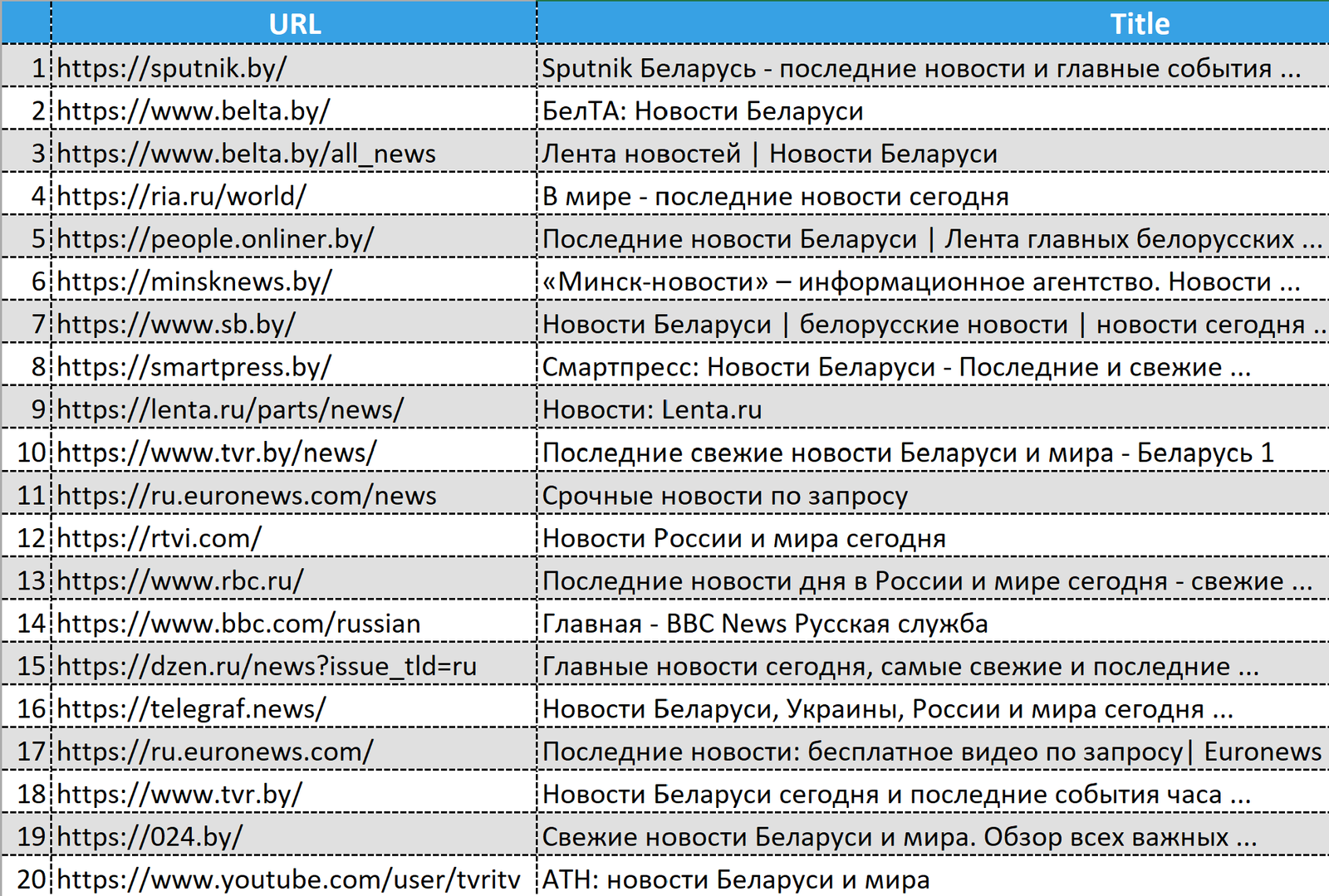
The leader is the news resource Sputnik Belarus, which is part of the international media group “Russia Today”. The media group is led by leading Russian propagandists – Dmitry Kiselyov and Margarita Simonyan. Another five purely Russian resources (ria.ru, lenta.ru, rtvi.com, rbc.ru, dzen.ru) and seven Belarusian resources with state ownership (belta.by, minsknews.by, sb.by, tvr.by, ATN: news of Belarus and the world).
The query News Belarus has an average monthly frequency in Belarus within 368-550 thousand requests per month:
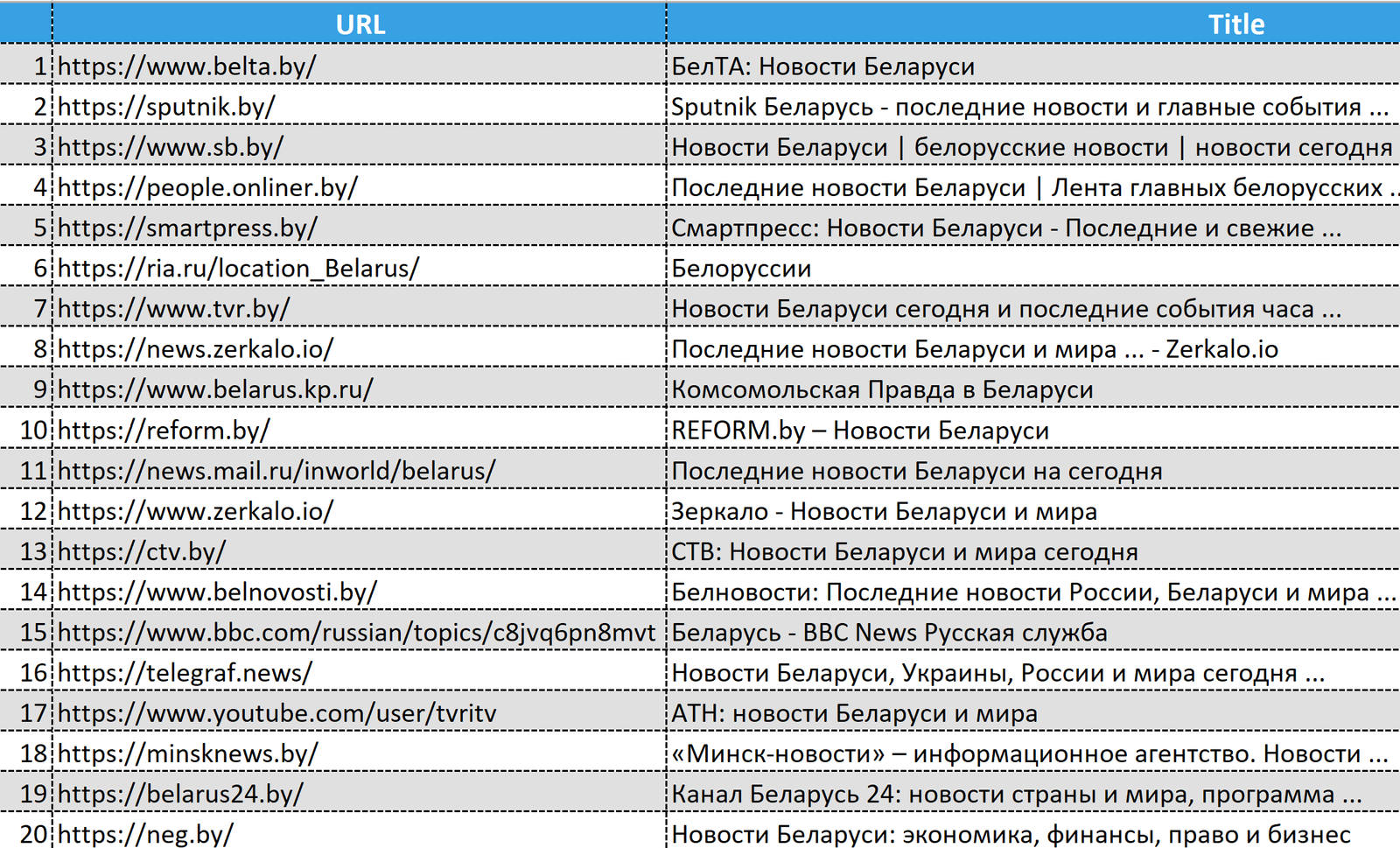
Here in the top twenty are seven Belarusian state resources. Three Russian sites and again in second place affiliated with the Russian Federation – Sputnik Belarus.
The query News Ukraine has an average monthly frequency in Belarus within 200-450 thousand requests per month:
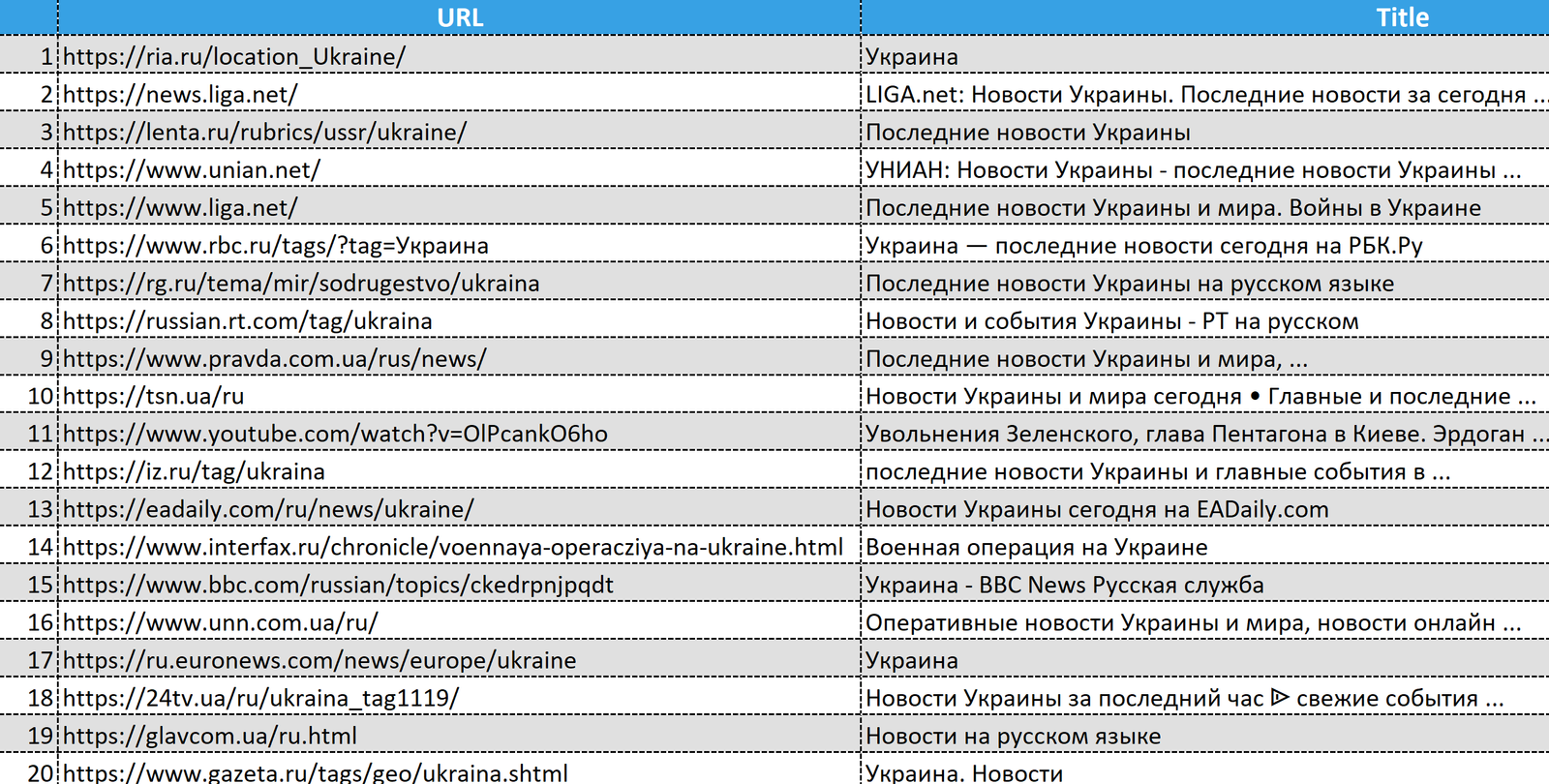
At the top of this query is RIA Novosti. In general, out of twenty resources – eight are Russian information resources. That is, Belarusian users searching in the search engine for news of Ukraine, get offers from the Google algorithm of news sites with Kremlin propaganda, where the war is called Putin’s term “Special Military Operation”.
This information influence is found in the results of public opinion polls. For example, in the November results, conducted by Chatham House, the answer to the question “Do you support or oppose military actions of Russian troops on the territory of Ukraine?”
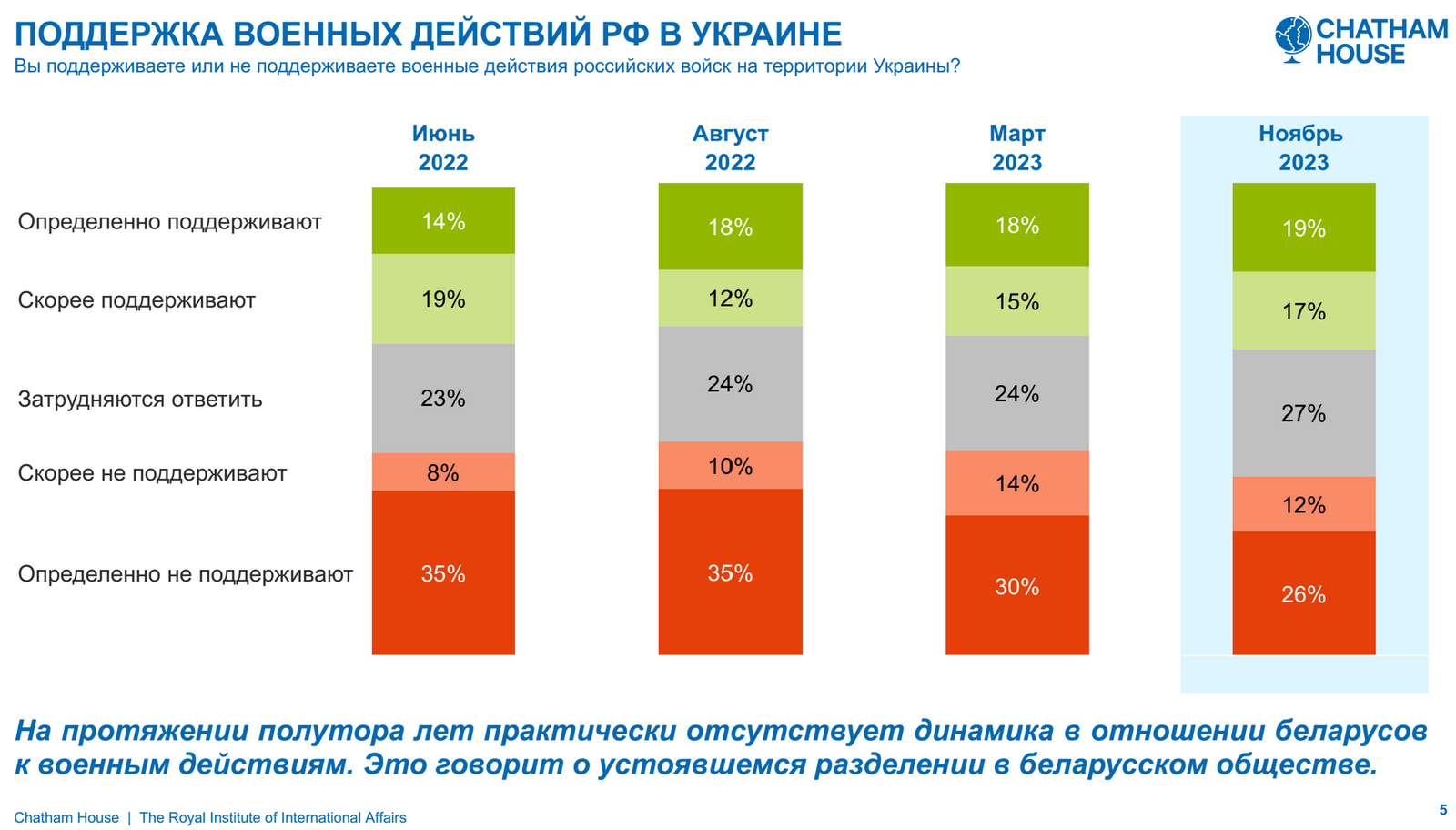
It should be noted the absence in the search results for the query “News Ukraine” of any Belarusian resources: neither state-owned nor independent media.
The query World News has an average monthly frequency in Belarus within 301-450 thousand requests per month:
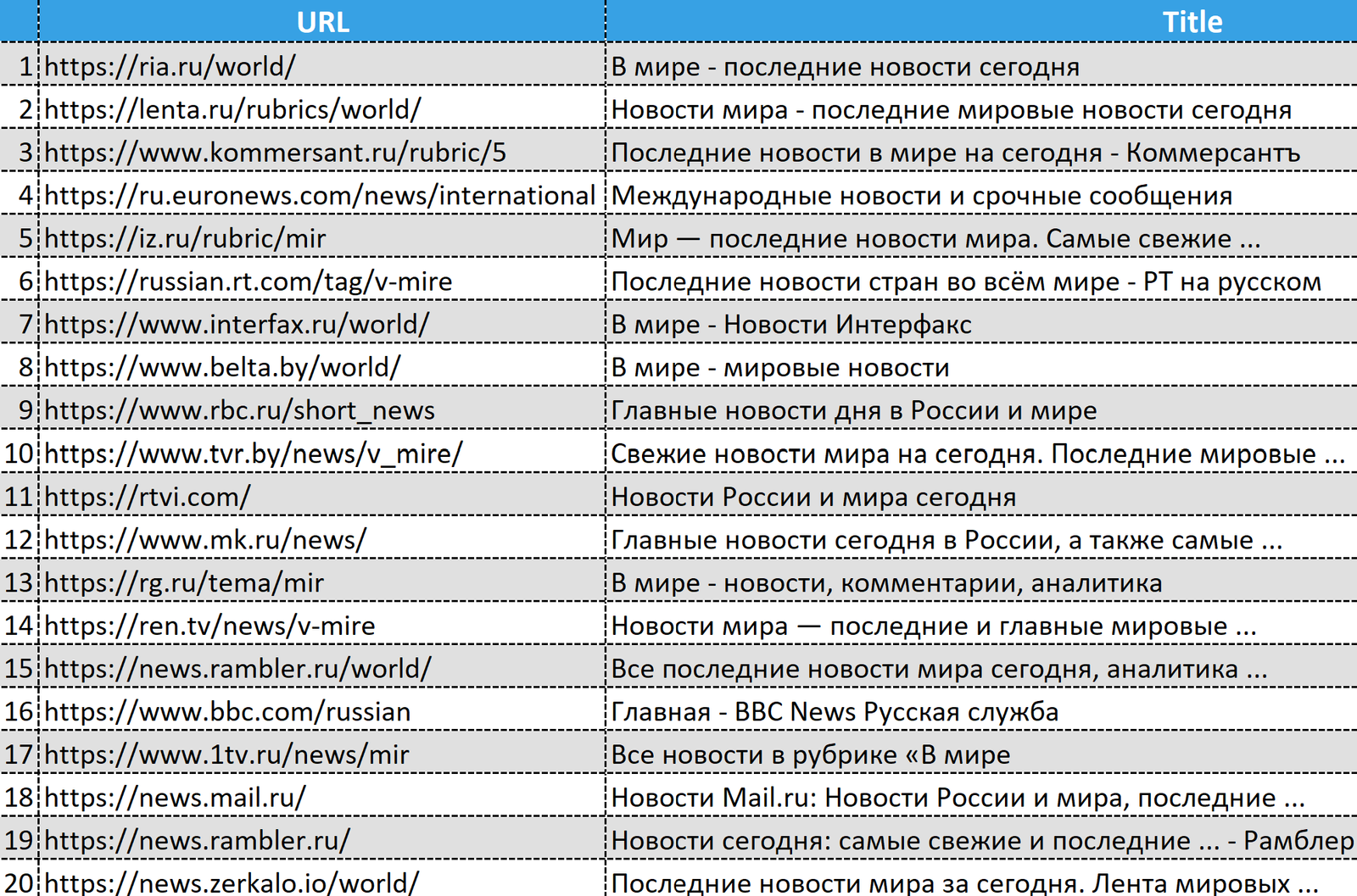
Here it is clear that it is almost impossible to get information from independent media by the search query World News. 16 out of 20 resources are Russian propagandist sites and aggregators.
Key words for Russian websites
Examined sites:
- ria.ru
- lenta.ru
- rbc.ru
- rt.com
- kp.ru
- gazeta.ru
Ria.ru has 9% search traffic from Belarus. This is 1.4 million requests per month and the total number of keywords by which the site ranks in organic search – 603 thousand.
Some organic keywords by which the site has leading positions in search results:
news ukraine (1); world news (1); news russia (1); world news today (1); map of military actions (1); news (4); instagram (6).
Lenta.ru has 9.51% of its search traffic from Belarus. That’s 507,500 queries per month and a total number of keywords for which the site ranks in organic search – 488,000.
Some organic keywords for which the site has leading positions in search results:
world news (2); russia news (3); ukraine news (3); news feed (1); urgent news from russia and the world (1); news (9); lenta (1).
Rbc.ru has 8.86% of its search traffic from Belarus. That’s 704,400 queries per month and a total number of keywords for which the site ranks in organic search – 775,000.
Some organic keywords for which the site has leading positions in search results:
currency converter (2); bitcoin rate (1); ukraine news (6); prigozhin (2); world news (9); alexander lukashenko (5); neural network draws (1).
Rt.com has 1.57% of its search traffic from Belarus. That’s 71,800 queries per month and a total number of keywords for which the site ranks in organic search – 117,000.
Some organic keywords for which the site has leading positions in search results:
world news (6); ukraine news today (2); russia news (6); ukraine news (8); crimea (2); video (3); poland news (3).
kp.ru has 6.53% of its search traffic from Belarus. That’s 620,400 queries per month and a total number of keywords for which the site ranks in organic search – 1.3 million.
Some organic keywords for which the site has leading positions in search results:
belarus news (9); dream book (1); mother’s day (1).
gazeta.ru has 8.17% of its search traffic from Belarus. That’s 205,900 queries per month and a total number of keywords for which the site ranks in organic search – 371,000.
Some organic keywords for which the site has leading positions in search results:
putin (2); alexander lukashenko (4); yandex news (5); russia news (9); military news (1); zelensky (3).
As was said at the beginning of the publication, experiments have shown that “independent research” is not always effective in combating misinformation. Search engines, like social networks, can contribute to the reinforcement of false beliefs. The importance of frequent quality checks and setting barriers for low-quality news is evident. Google’s initiatives to warn about the lack of reliable information are a step in the right direction.
It is important to put more effort and resources into programs for digital media literacy and critical thinking online. Creating an informed public that can recognize misinformation is key in the fight against this problem.









